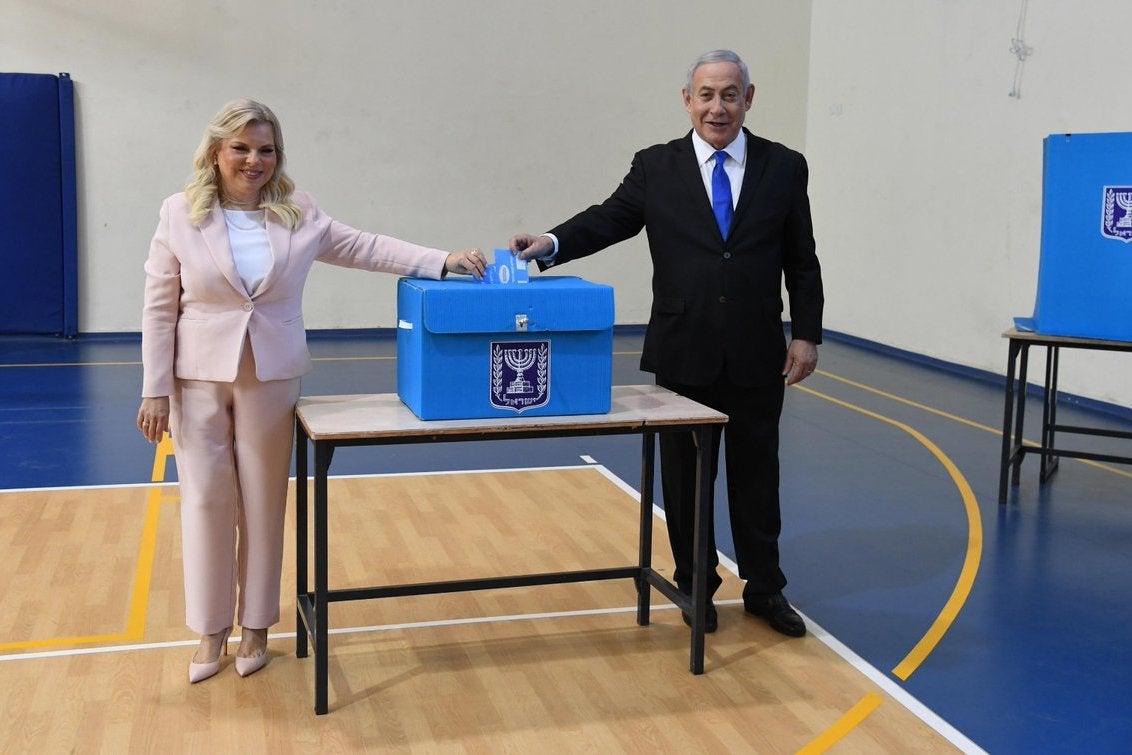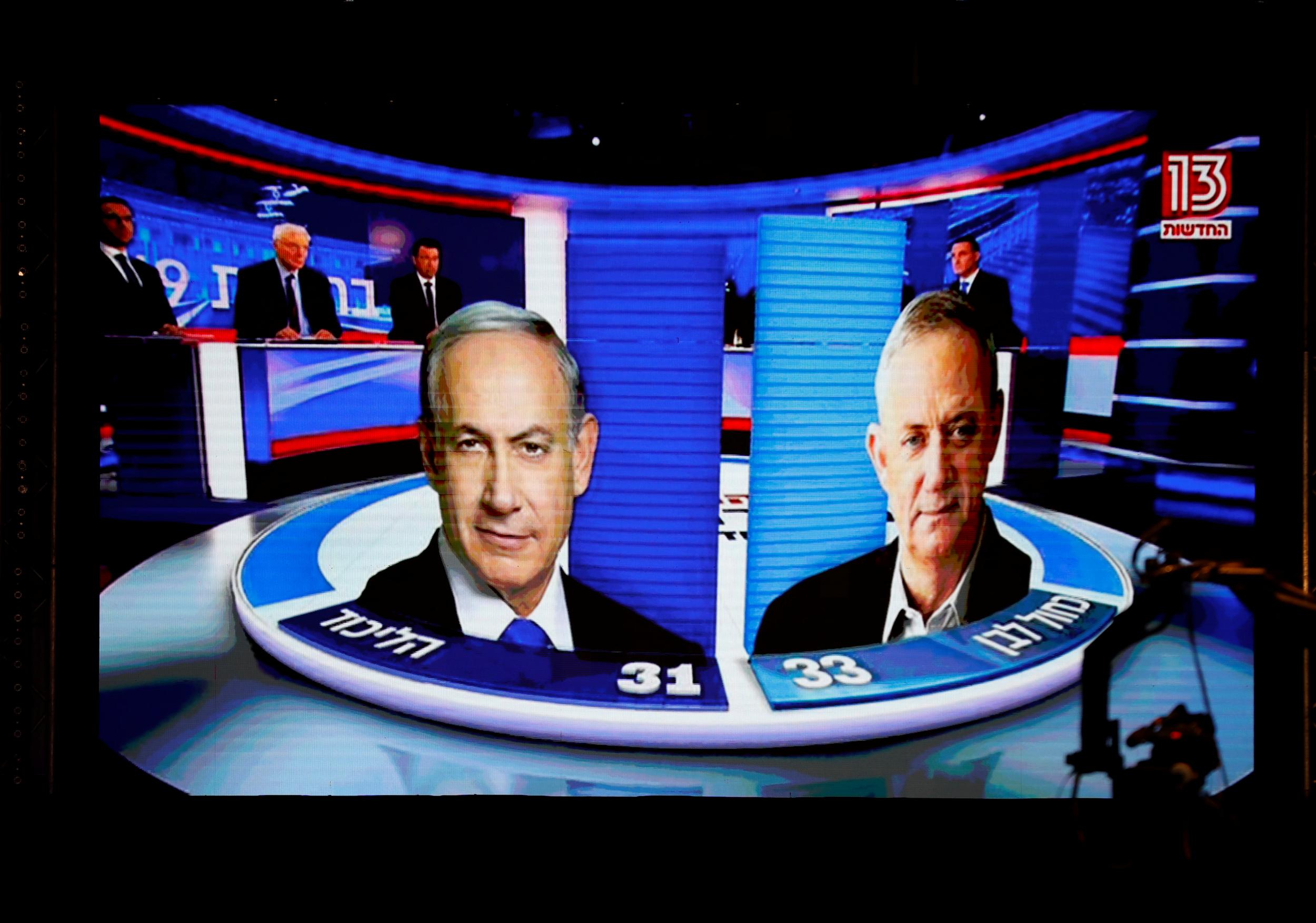Israel election: Netanyahu suffers devastating blow after hard-right coalition fails to win majority, exit polls indicate
None of the polls found that his right-wing bloc would be able to secure the 61-seat majority needed to form a government
Your support helps us to tell the story
From reproductive rights to climate change to Big Tech, The Independent is on the ground when the story is developing. Whether it's investigating the financials of Elon Musk's pro-Trump PAC or producing our latest documentary, 'The A Word', which shines a light on the American women fighting for reproductive rights, we know how important it is to parse out the facts from the messaging.
At such a critical moment in US history, we need reporters on the ground. Your donation allows us to keep sending journalists to speak to both sides of the story.
The Independent is trusted by Americans across the entire political spectrum. And unlike many other quality news outlets, we choose not to lock Americans out of our reporting and analysis with paywalls. We believe quality journalism should be available to everyone, paid for by those who can afford it.
Your support makes all the difference.Benjamin Netanyahu has fallen short of securing a parliamentary majority with his hard-right allies in Israel‘s unprecedented second election, exit polls and preliminary results have shown.
The apparent set back dealt a devastating blow to the embattled prime minister who is campaigning under the shadow of indictment across three corruption cases and so fighting for his political survival.
The polls were posted by Israel’s three major TV stations after polling stations closed across the country, indicating his political future could be in doubt.
Partial results released hours later by the country’s elections commissions, based on over 40 per cent of the vote counted, also showed Mr Netanyahu, his Likud party and their allies had failed to win an outright majority.
Mr Netanyahu had sought a clear victory with his right-wing partners to secure immunity from three expected corruption trials.
But polls by Israeli TV channels 12, 13 and 1 all placed the centrist Blue and White party, headed by his chief rival Benny Gantz, in the lead.
Equally damning was that none of the polls found that Mr Netanyahu’s right-wing bloc would be able to secure the 61-seat majority of the Knesset needed to form a government.
Partial results released by the central elections committee Wednesday morning, meanwhile, showed a tie between Blue and White and Likud.
Israel media reported the same outcome, but based on more than 90 per cent of the vote counted, and did not explain the discrepancy with the commission’s percentage.
The results raise the likelihood of a unity government among the three parties, but it’s unclear what part Netanyahu and the Likud could take.
The official elections results are expected later on Wednesday.
From his half-empty elections headquarters in Tel Aviv early Wednesday morning, Mr Netanyahu refused to concede defeat or claim victory but promised to get to work building a “Zionist government”. He blamed the media for one-sided coverage, as supporters chanted against a unity coalition in front of him.
“Israel needs a strong and Zionist government. There won’t, and cannot be, a government that relies on anti-Zionist Arab parties that deny the very existence of Israel as a Jewish and democratic state,” he said from the podium.
“This election has been one of the toughest we’d known,” he added.
Across town Benny Gantz, and his three co-leaders ex-military chiefs Gabi Ashkenazi and ”Bogie” Yaalon, as well as Yair Lapid, a former TV journalist, said that, while they would wait for the final results it was clear that Mr Netanyahu did ”not succeed in his mission” to win a fifth term.
“Millions of citizens chose to say no to incitement and schism and yes to unity,” Mr Gantz continued.
He also reiterated the party’s call for a unity government, saying that he would urge all parties to start coalition talks. His party have said in the past they would join forces with Likud but on the condition that Mr Netanyahu steps down as leader, citing his possible corruption trial.

The country was forced back into fresh elections just five months after the April polls when Mr Netanyahu failed to form a coalition government.
His former defence minister Avigdor Lieberman, the head of right-wing Yisrael Beiteinu, in the 11th hour refused to join forces with the Likud meaning the prime minister could not nudge past a 61-seat majority.
The exit polls and preliminary results suggest there may be similar deadlock this time, with no side showing a clear majority.
Nir Barakat, a Likud politician and former mayor of Jerusalem, told The Independent the party had not ruled out the possibility of forging a unity government with Blue and White, but would refuse to drop the ultra-Orthodox parties as allies or Mr Netanyahu as their leader.
“It looks like there is no decisive decision by the people of Israel, the biggest challenge will be how to form a government... it is a challenge.”
“We hope there are no third elections,” he added.
Diehard Likud supporters meanwhile expressed concern about the possibility Mr Netanyahu would have to step down.

“It’s Bibi or nothing,” said Avi, 28, wearing a Likud T-shirt and referencing Mr Netanyahu’s nickname.
“Without Bibi there is no Likud, there is no Right, there is no country. There is nothing. Period.”
In the headquarters of the Blue and White Party, where the mood was subdued, party officials were cautiously optimistic.
“It’s very close so we will wait to hear what the official results are but this is significant. No exit poll has shown [Netanyahu] come close to a majority, in none of them does he have the 61 seats to build an immunity coalition for himself. This is a huge success for Blue and White,” Yair Zivan an adviser to Yair Lapid told The Independent.
He added: “We are also the largest party in the exit polls. This says the public has had enough with Netanyahu. He pulled out all the stops today – he went even further than he did in the last campaign and didn’t get the support of the public.”

Mr Zivan reiterated Blue and White’s call that they forge a national unity government with Likud but without Mr Netanyahu, because of his likely indictment.
The exit polls and preliminary results also indicated that far-right ultra-nationalist Jewish Power party, led by followers of the late rabbi Meir Kahane, who advocated expelling Arabs from Israel and creating a Jewish theocracy, was unable to cross the electoral threshold.
The third biggest party was the Arab Joint List, polling between 11 and 15 seats, the most they have ever received.
All suggested that the Soviet-born Lieberman could once again play kingmaker, with his party sweeping between eight and 10 seats which could easily nudge either the right bloc or centre-left past the threshold.
Mr Lieberman, who has twice caused Mr Netanyahu’s ruling coalition to collapse, vowed on Tuesday to avoid a third election.
He instead said he would try to force a secular unity government between his party, Likud and Blue and White that would leave out the ultra-Orthodox parties.
“We only have one option: A broad, liberal, national government made up of Yisrael Beiteinu, Likud and Blue and White,” he said late on Tuesday.
We only have one option: A broad, liberal, national government made up of Yisrael Beiteinu, Likud and Blue and White
Over six million people were eligible to vote in the polls. Israel's election commission said that turnout was 69.4 per cent by the time polling stations closed on Tuesday evening, a slightly larger number than took part in April's vote.
Turnout in April’s elections was 68.5 per cent.
Mr Netanyahu, desperate to cling on to power, campaigned furiously right up until the final hours of the vote.
In the week leading up to the polls, he promised to annex the occupied West Bank, he nearly launched a military offensive in Gaza, he tabled a military defence pact with the US president, Donald Trump, flew to Russia to meet President Putin and, unusually, agreed to a slew of interviews.
Throughout the day of the election he frantically begged supporters to vote and repeatedly warned of a high “Arab and Left” voter turnout.
“It’s not in the bag. But if you go (vote), we will win,” Mr Netanyahu blared through a megaphone to shoppers at a Jerusalem market.

However his frantic warnings about Arabs appeared to have backfired, instead encouraging Arab-Israelis to head to the polling stations.
Ayman Odeh, leader of the main Arab faction in parliament, said Mr Netanyahu’s repeated attacks had boosted turnout and ultimately likely hurt the incumbent.
“There’s a heavy price to pay for incitement,” he told Channel 13 TV.
Ahmad Tibi, another leading Arab-Israeli politician, quipped “we voted in droves” in a post on Twitter, referencing Mr Netanyahu’s phrasing at a previous election.
Meanwhile Facebook punished Mr Netanyahu's page for the second time during the campaign, briefly suspending his automated chat function after it illegally published an opinion poll in the days before the election. Last week, the account was suspended for 24 hours after a racist post claimed that Arabs want to “annihilate all of us.”
At the polling stations voters expressed frustration at having to vote for the second time in under six months, even among Mr Netanyahu’s supporters, suggesting the second round of elections may have damaged his credibility.

“This change has come because [Netanyahu] is now apparently stressed. He sees that things aren’t going this way, and people understand this,” Ali Jaffaly, an Arab-Israeli who owns a store in Jaffa and was voting for the Arab Joint List.
“He feels that he’s gotten weaker, that there’s a change happening,” he added.
Avi , 41, who voted for ultra-Orthodox United Torah Judaism party, which is part of Mr Netanyahu’s Right bloc, said: “He seems to be trying everything to get supporters to vote. He is the only man credible enough to be prime minister but no one understands why we are voting again, especially since nothing has changed.”

Join our commenting forum
Join thought-provoking conversations, follow other Independent readers and see their replies
Comments